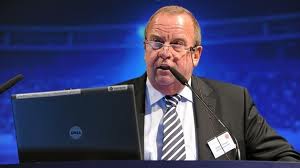By David Owen
September 23 – FIFA is resigned to running up unexpected extra costs to ensure that an effective drug testing programme is in operation at next year’s FIFA World Cup in Brazil. Michel D’Hooghe (pictured), the governing body’s leading medical expert, acknowledged as much in a short telephone conversation with insideworldfootball at the weekend. D’Hooghe said the cost issue was one of the reasons FIFA was “not happy”.
FIFA’s predicament arises because the doping control laboratory in Rio de Janeiro, normally expected to play a major role both at the World Cup and the Rio 2016 Olympics, has had its accreditation revoked by the World Anti-Doping Agency (WADA).
The facility – the UFRJ doping control laboratory, also known as LADETEC – can appeal to the Court of Arbitration for Sport (CAS) before the revocation officially takes effect on September 25.
But, as things stand, it seems unlikely it will be able to regain its accreditation in time for the World Cup.
Once the revocation takes effect, the lab will no longer be authorised to carry out the testing of doping control samples on behalf of WADA or any testing authority.
Insideworldfootball understands that the alleged shortcomings which prompted WADA to take action against the lab relate to a so-called “blind” test.
Under WADA’s External Quality Assessment Scheme (EQAS), urine and blood samples are distributed periodically by WADA to accredited labs to be tested for the presence – or absence – of prohibited substances.
In a “blind” test, the laboratory knows that the sample has been supplied under the EQAS scheme, but not what substance it might contain.
Labs are also sometimes required to undergo “double blind” tests, in which the EQAS samples are indistinguishable from normal samples, and might be blank, adulterated, or contain banned substances.
D’Hooghe insisted that FIFA would “find a solution”.
A first indication of the form this solution will take may come in the wake of a medical committee meeting in Zurich on October 2.
Contact the writer of this story at moc.l1745116149labto1745116149ofdlr1745116149owedi1745116149sni@n1745116149ewo.d1745116149ivad1745116149

